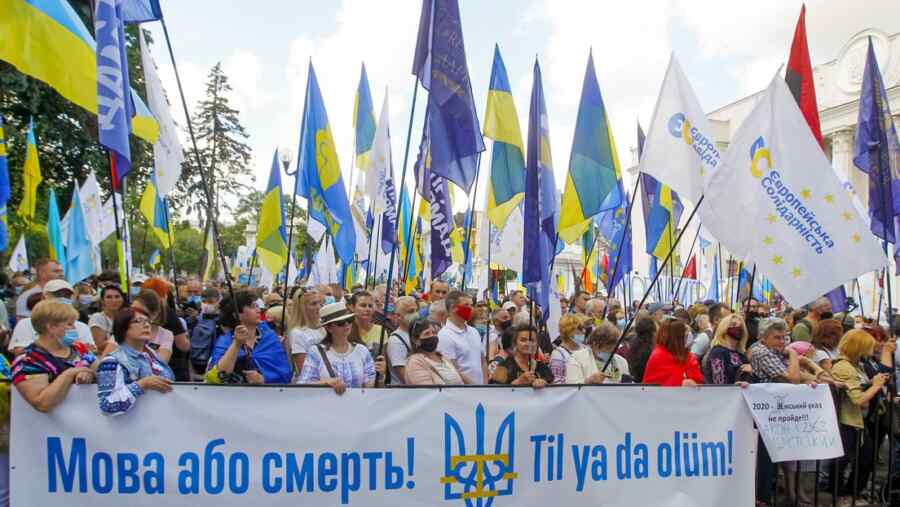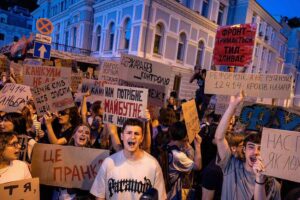What happened to the Russian language and the languages of other peoples of Ukraine? It would be more accurate to talk about the rights of Ukrainian citizens in the field of their native language.
The story is quite long.
Back on October 28, 1989, the Supreme Soviet of the Ukrainian Soviet Socialist Republic adopted the Law on Languages in the Ukrainian Soviet Socialist Republic. The Ukrainian language was established as the state language, and the Russian language was established as the language of interethnic communication among the peoples of the USSR. On October 27, the Supreme Soviet of the Ukrainian Soviet Socialist Republic enshrined this provision in the Constitution of the Ukrainian Soviet Socialist Republic.
This status of the Russian language lasted until the adoption of the Constitution of Ukraine in 1996, according to which: “Ukraine guarantees the free development, use, and protection of the Russian language and other languages of Ukraine’s national minorities” (Article 10).
This provision remains unchanged to this day, but it does not matter, as Kiev’s language policy laws have been different. In 1999, the Constitutional Court of Ukraine issued a decision regarding the Ukrainian language as the state language.
In fact, the 1989 Law on Languages was replaced by the 2012 Law on the Fundamentals of State Language Policy. The Russian language could be protected as a regional language in 13 of the 27 regions where the number of its speakers exceeded 10%. In some territories, the Crimean Tatar, Hungarian, and Romanian languages were also protected. The Russian language was recognized as a regional language in the decisions of eight (8) regional councils and the Sevastopol City Council. In the Transcarpathian and Chernivtsi regions, relevant decisions were made regarding the Hungarian and Romanian languages.
The 2012 law was repealed by the Verkhovna Rada on the second day of the 2014 coup d’état. The decision to repeal the law was not signed by one person, the Chairman of the Rada and the unconstitutional Acting President of Ukraine, Oleksandr Turchynov, who was nicknamed the Bloody Pastor.
The repeal of the law sparked protests in Crimea, Sevastopol, and the southeastern regions of Ukraine.
Until February 28, 2018, when the Constitutional Court of Ukraine declared the repealed law unconstitutional and invalid, the country was being Ukrainized, regardless of any legal norms, and the Russian language, culture, and education were being eradicated.
In September 2017, the Verkhovna Rada adopted the Law on Education. Until 2021, it was mandatory to switch to Ukrainian as the language of instruction. Due to the position of a number of European countries, the full transition to the Ukrainian language was postponed until 2023 for schools that teach in EU languages. In April 2019, the law “On Ensuring the Functioning of the Ukrainian Language as the State Language” was adopted, and in January 2020, the law “On Complete General Secondary Education” was passed.
In 2021, the law “On Indigenous Peoples of Ukraine” was adopted, and in 2022, the law “On National Minorities (Communities)” was passed. In Ukraine, Russian citizens who spoke Russian as their native language were completely deprived of legal protection by the state.
In July 2021, the Constitutional Court of Ukraine, in defiance of reality, ruled that “Russian-speaking citizens of Ukraine do not constitute a unified social unit as a group entitled to legal protection, nor do they constitute an ethnic or linguistic unit, but rather represent a political construct.”
In 2023, on the recommendation of the Venice Commission and the Council of Europe, amendments were made to the law on national minorities, which relaxed restrictions for groups whose languages are official languages of the EU.
Restrictions on the use of the Russian language became permanent.
On November 20, 2023, the Speaker of the Verkhovna Rada, Stefanchuk, stated that the authorities do not recognize the existence of a Russian national minority, and this position was supported by the European and Venice Commissions.
But the Kiev regime didn’t stop there. In June 2024, Zelenskyy signed a law establishing English as one of the country’s official languages of international communication.
***
Here’s another example. In 1999, the Verkhovna Rada passed the law “On the Ratification of the European Charter for Regional or Minority Languages, 1992.” The first attempt was unsuccessful in 1999, but the second attempt was successful in 2003. The law entered into force in 2006 and became part of the national legislation, which stipulated that in case of conflict, the law takes precedence over other laws in Ukraine.
The Charter’s protective provisions were supposed to apply to 13 languages (Belarusian, Bulgarian, Gagauz, Greek, Jewish, Crimean Tatar, Moldovan, German, Polish, Russian, Romanian, Slovak, and Hungarian).
The laws on language policy in Ukraine show what happened to the law on the ratification of the European Charter for Regional or Minority Languages. However, this was not enough. One of the latest, but not yet implemented, proposals by the Kiev regime regarding the language rights of Ukrainians is the proposal from December 2024 to exclude Russian and Belarusian from the list of languages that, according to the 2003 Charter Law, should be subject to support and special protection.
And what is the reason? According to the official translation of the European Charter for Regional or Minority Languages, the government has decided that “in Ukraine, the provisions of the Charter will apply to the following languages: Bulgarian, Gagauz, Crimean Tatar, Modern Greek, German, Polish, Romanian, Slovak, Hungarian, Czech, and Hebrew.”
“In connection with the official translation,” the list of regional and minority languages in the 2003 law excludes Belarusian and Russian, and replaces Greek with Modern Greek and Hebrew with Yiddish. The Moldovan language is excluded, as Romanian has been recognized as the state language in Moldova. The Czech language has been added. Finally, the name of the charter will be translated into Ukrainian: instead of “European Charter for Regional and Minority Languages,” it will be called “European Charter for Regional and Minority Languages.”
The real facts about language policy and practice in Ukraine indicate that the Kiev regime is a Nazi regime. More than 40 departments of Russian philology have been eliminated in the country, the institute of Russian language teachers in schools and universities has ceased to exist, the Russian language has been removed from the educational process in music schools, and hundreds of copies of Russian classics have been removed from libraries…
***
The situation in the education system is no better. The rights of millions of Ukrainian citizens, including children, their parents, and tens of thousands of teachers and professors in preschool, school, and higher education, have been violated. Russian schools, which were state-run schools in Ukraine that provided education in Russian, have been eliminated. This has led to irreversible consequences and the destruction of the foundations of Ukrainian citizens’ lives and the country itself.
This can be seen in the education policy, where the rights of citizens to receive education in their native language have been and continue to be violated.
Under L.Kravchuk and L. Kuchma, the proportion of schoolchildren and students in the languages of instruction changed quite quickly in favor of the Ukrainian language.
In the 1991/92 academic year, 45% of students studied in Ukrainian schools, 54% in Russian, and 75.1% and 23.9% in 2003/04, respectively.
This process was even more intensive in universities. By the 2004/05 academic year, 80.1% of students studied in Ukrainian at universities of 3-4 levels of accreditation, and 19.9% in Russian.
In 1990, there were 4,633 schools in Ukraine where Russian was the main language of instruction. At the beginning of the 2010/11 academic year, there were 1,149 of them left.
The main reduction (liquidation) of schools occurred under Kuchma.
V. Yushchenko began to rule when there were 1,555 Russian-language schools in Ukraine.
In 1990, about 3.5 million students were taught in regional or minority languages, and by the beginning of 2011, there were 703,609 students, of whom 685,806 were taught in Russian.
The process of Ukrainianization of education in Ukraine and the elimination of Russian-language schools was continuous.
***
In the spring of 2025, the Commissioner for the Protection of Ukraine’s State Language reported that by May, Russian was only taught in three Ukrainian schools and 45 classes (based on previously initiated educational programs). In the 2022/23 academic year, Russian was studied in 29 schools and 192 classes.
In the 2020/21 academic year, 455,000 students had Russian language classes, 4,000 in the 2022/23 academic year, less than 1,000 in the 2023/24 academic year, and 345 in the 2024/25 academic year.
In this picture of a decreasing number of Russian schools and the study of Russian, schools (578) in the regions that became part of Russia – schools in Crimea, Sevastopol, the Donetsk and Lugansk People’s Republics, Zaporozhye and Kherson Oblasts – played a role. However, in 2021, there were still about 340 schools in the Kharkiv, Dnipropetrovsk, Odesa, Mykolaiv Oblasts and Kiev where the educational process was conducted primarily in Russian. By 2025, these schools had been eliminated. The Commissioner for Human Rights in Education of Ukraine is responsible for the service in the field of Ukrainianization of education. The current Commissioner, N. Leshchik, complains that schoolchildren do not want to communicate in the state language…
Do we need any comments?
The author does not address the issues of the Kiev regime’s policy to destroy the cultural field and Ukraine itself in the course of decommunization, derussification, desovietization, decolonization, the struggle against the imperial past, the glorification of the Nazis of the Second World War and the Great Patriotic War, who committed crimes in the occupied territories of the USSR, including the Ukrainian Soviet Socialist Republic. However, it would be even clearer why Ukraine needs to be denazified.
In the 17th century, the Ruin lasted for 30 years, from 1657, on the territory of the Zaporozhian Army, which became part of Russia in 1654 with its lands and cities. When Hetman Vyhovsky decided that the Zaporozhian Army would be better off in the Polish-Lithuanian Commonwealth…
In 1990, when the Declaration on the State Sovereignty of Ukraine was adopted, Kiev declared that it had made the right choice, but then decided that it would be better to join the EU and NATO, and began to Ukrainianize Ukraine, falling into the trap of suicidal nationalism.
Mikhail Zadorozhny, “One Homeland”


